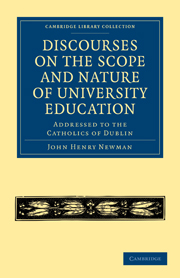Book contents
- Frontmatter
- PREFACE
- Contents
- CORRIGENDA
- Discourse I Introduction
- Discourse II Theology a Branch of Knowledge
- Discourse III Bearing of Theology on other Branches of Knowledge
- Discourse IV Bearing of other Branches of Knowledge on Theology
- Discourse V General Knowledge viewed as One Philosophy
- Discourse VI Philosophical Knowledge its own end
- Discourse VII Philosophical Knowledge viewed in relation to Mental Acquirements
- Discourse VIII Philosophical Knowledge viewed in relation to Professional
- Discourse IX Philosophical Knowledge viewed in relation to Religion
- Discourse X Duties of the Church towards Philosophy
- Appendix
Discourse IV - Bearing of other Branches of Knowledge on Theology
Published online by Cambridge University Press: 05 July 2011
- Frontmatter
- PREFACE
- Contents
- CORRIGENDA
- Discourse I Introduction
- Discourse II Theology a Branch of Knowledge
- Discourse III Bearing of Theology on other Branches of Knowledge
- Discourse IV Bearing of other Branches of Knowledge on Theology
- Discourse V General Knowledge viewed as One Philosophy
- Discourse VI Philosophical Knowledge its own end
- Discourse VII Philosophical Knowledge viewed in relation to Mental Acquirements
- Discourse VIII Philosophical Knowledge viewed in relation to Professional
- Discourse IX Philosophical Knowledge viewed in relation to Religion
- Discourse X Duties of the Church towards Philosophy
- Appendix
Summary
Nothing is more common in the world at large, than to consider the resistance, made on the part of religious men, especially Catholics, to the separation of Secular Education from Religion, as a plain token, that there is some real contrariety between human science and Revelation. It matters not to the multitude who draw this inference, whether the protesting parties are aware that it can be drawn or not; it is borne in upon the many, so to say, as self-evident, that religious men would not thus be jealous and alarmed about Science, did they not feel instinctively, though they may not recognise it, that knowledge is their born enemy, and that its progress will be certain to destroy, if it is not arrested, all that they hold venerable and dear. It looks to the world like a misgiving on our part similar to that which is imputed to our refusal to educate by means of the Bible only; why should you dread it, men say, if it be not against you? And in like manner, why should you dread secular education, except that it is against you? Why impede the circulation of books which take religious views opposite to your own? Why forbid your children and scholars the free perusal of poems or tales or essays or other light literature which you fear would unsettle their minds? Why oblige them to know these persons and to shun those, if you think that your friends have reason on their side, as fully as your opponents?
- Type
- Chapter
- Information
- Discourses on the Scope and Nature of University EducationAddressed to the Catholics of Dublin, pp. 103 - 134Publisher: Cambridge University PressPrint publication year: 2010First published in: 1852

